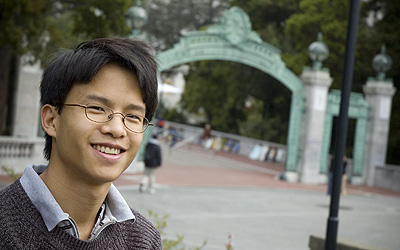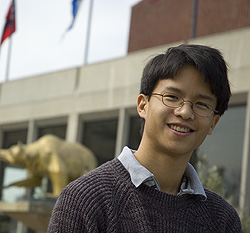UC Berkeley Web Feature
 |
Fifth-year senior Brian Loo on Sproul Plaza, where he spent a lot of time tabling for Model U.N. and Peer Counseling. (BAP photos) |
Arabic and English major Brian Loo wants to put his ideals into action in the Middle East
BERKELEY – University Medal finalist Brian Loo took a big risk in his essay applying for the campus's top award. The fifth-year Arabic and English double major mentioned not a single one of his many inspiring public-service and extracurricular activities: serving as president of UC Berkeley's Model United Nations, peer counselor, immigrant-aid volunteer, and scholarship founder.
Instead, he chose to describe the "academic theories and personal epiphanies that form the backbone of my worldview." His essay thus takes readers on a journey from Benedict Anderson's book "Imagined Communities," through Edward Said's seminal "Orientalism" and Carl Rogers's model of empathetic counseling, to finish with a literary theory that if "reality is unfiltered chaos" — filtered differently by each person — then literature is a joint effort between author and reader to make order from that chaos.
This intellectual high-wire act, though unusual by University Medal standards, is entirely in character for Loo. In both classes he took with Janet Adelman, "he distinguished himself particularly by the quality of his papers, which were uniformly bold and wide-ranging in their thought … and beautifully argued," wrote the professor and chair of the English department in a letter recommending him for the Medal.
 The
University Medal The
University MedalEstablished in 1871 by California Governor Henry Huntly Haight, the University Medal honors UC Berkeley's most distinguished graduating senior. Three to five students are also named as finalists. [an error occurred while processing this directive] |
At heart, Loo is an idealist — one who believes that nationality, religion, and culture are often masks that prevent people from recognizing others as both unique individuals and human beings with the same basic needs and rights as themselves. And although in simplified form this might sound a lot like the lyrics to John Lennon's song "Imagine," Loo is not just thinking about this philosophy, he is trying to figure how to live it.
Growing up in Redlands, California, an hour east of Los Angeles "in the smog dumpster," as he cheerfully puts it, Loo was as self-involved as any typical adolescent. Although he was very active in speech and debate, developing a taste for public speaking that he would satisfy later at Berkeley's Model United Nations, he didn't pay much attention to world events. That is, until the middle of his senior year in high school, when Loo's half-Lebanese friend started crying over Israel's announcement that it was going to bomb Lebanon.
"I realized there was this whole world out there that I wasn't even aware of," Loo says. He began to learn about the Middle East, and enrolled in an elementary Arabic language class for his first semester of school at UC Berkeley.
Then came the terrorist attacks of September 11, 2001. Loo was stunned, disturbed by all the Middle Eastern stereotypes and talk of war in the news. He tried — and failed — to organize a sit-in for peace, and joined the memorials and protests on Sproul Plaza. And he founded a scholarship, "Plans for Peace," at his old high school in Redlands. The scholarship would give $600 to the best research paper, chosen by a community committee, about a peaceful solution to any international conflict of the student's choosing.
"I was just a little freshman at a big university, but I thought that everyone should be doing something, and this is what I can do," says Loo. "I know an essay is not going to change the world, but it's a gesture toward what I think will help: for people to learn to think about the international community in terms of ourselves."
Loo tapped local businesses for donations for "Plans for Peace," but ended up funding most of it himself, by two summers' worth of working the midnight shift doing grocery inventory. (He discontinued the scholarship after 2004.)
He also threw himself into Model United Nations, which simulates the workings of the United Nations through meetings and national conferences that include, for example, mock Security Council meetings, debating real international issues like the Israel-Palestine problem, and even occasionally expands to include the participation of counterparts like NATO. In his five-year involvement, Loo served at times as chief of staff, deputy secretary general, and president of the 60-student Berkeley chapter, helping to run the annual conference of more than 400 participants from around the globe.
As president, "I was nominally in charge of everything and at the same time, really in charge of nothing," he laughs. "It suited me well. I really enjoy making people cooperate."
 'It's a big leap from high school to Berkeley. You have to look out for yourself and find people who will help you.' -Brian Loo |
Loo played a similar supervisory role as the coordinator of the Student to Student Peer Counseling (SSPC) program, which he joined as a sophomore. His involvement "began with randomness, as most things do with me": a friend in the dorms was a SSPC counselor and invited him to come along. Loo, who had known someone in high school who attempted suicide, was immediately interested.
SSPC uses the Rogerian model for therapy, which as Loo explained in his essay is based on the belief that truly knowing another person's complex psychological and emotional makeup is impossible, and a counselor should simply, by conveying unconditional empathy, help clients explore their own feelings and ideas about their problems. Essentially, for roughly seven hours a week, Loo makes himself available to listen to his fellow students.
"Just being there for someone can make a huge difference at a large university, where it's all too easy for people to fall through the cracks," he says.
That said, Loo also believes students need to take an active role in their Berkeley experience. "Go after what interests you. Here, you can't just sit back and wait for things to happen," he says when asked what advice he would give to freshmen. "You can't just write a good paper and expect to get a recommendation letter from a professor later — you have to go to office hours. It's a big leap from high school to Berkeley. You have to look out for yourself and find people who will help you."
Despite his demanding double major and his many extracurricular activities — he also volunteered at the East Bay Sanctuary Covenant, helping immigrants with work and residency-related applications — Loo managed to maintain a 3.975 grade point average. He did take the fall 2003 semester off entirely, saying he was "totally burnt out" after spending the summer of 2003 in Lebanon, studying advanced Arabic at the American University in Beirut. His parents were supportive this break, but they said he would have to pay his own bills; Loo got a job at a local bookstore and spent the semester recharging.
Although he loved his time in Beirut — "it was such a beautiful city, and people were so warm and welcoming" — he ended up studying 10 to 12 hours per day, which left very little time for travel. Loo made one trip out of Lebanon, to Damascus. He also didn't get to socialize much, but he enjoyed the shock that his language abilities inspired in the Lebanese. "They're not used to seeing many Chinese-looking people, and I was the first many had met who could speak Arabic."
By learning to speak, read, and write this incredibly difficult language — Loo pens poetry and fiction in both Arabic and English — he hopes to serve as an ambassador between American and Arab cultures, dispelling stereotypes on both sides. After graduation, he hopes to attend one of the State Department's summer language schools in either Yemen and Lebanon, followed by a year-long intensive language study in Qatar or Egypt. It all depends on which scholarships and fellowships come through.
And looking even further into the future, he isn't sure exactly what he'll do. "I'd like to volunteer — or work for subsistence pay — for a humanitarian aid group or nongovernmental organization in the Middle East, teaching English in a Palestinian refugee camp, for example. Then I'll probably come back to the States for graduate school, because that's what everyone does," he laughs. "I'm hoping I'll have it all figured it out by then."
At least one of his professors has confidence that he will. "I think that Brian's work will always make a difference, and that we will be very glad to claim him as one of ours," wrote Adelman.

